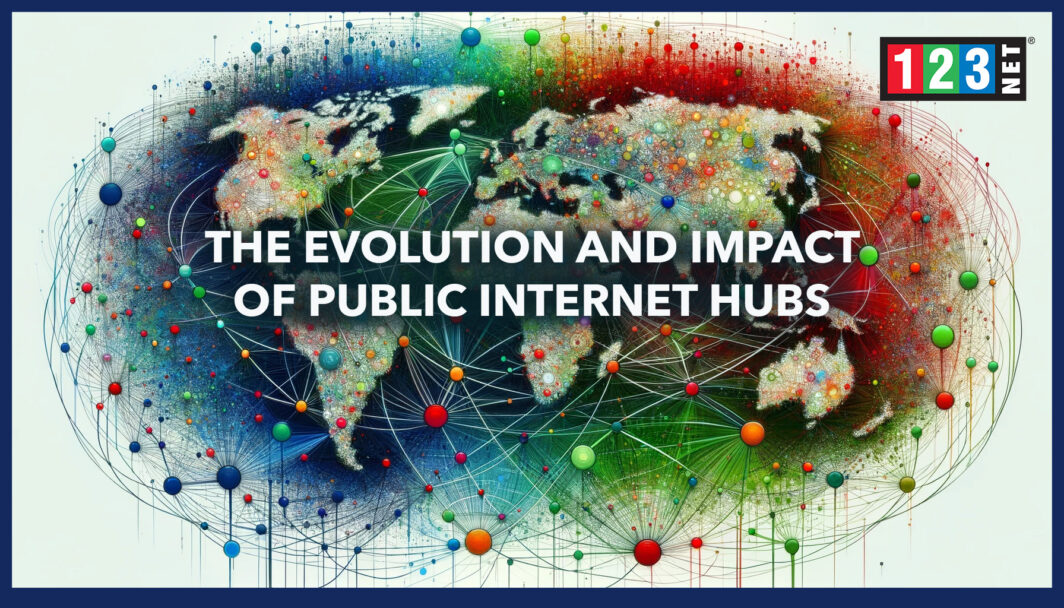
Introduction
Public Internet Hubs are crucial in digital connectivity. They act as the internet’s backbone. Often called Internet Exchange Points (IXPs), they are vital. Here, ISPs exchange internet traffic. This system began in the internet’s infancy. It has grown from basic meeting spots to complex data centers. These centers ensure worldwide connectivity. This change highlights digital infrastructure’s importance. It’s key in our digital economy. It allows smooth communication worldwide. Access to information across continents becomes easier. Public Internet Hubs have thus transformed. They’ve moved from simple origins to essential global nodes. This infrastructure supports economic growth. It also fosters global understanding. Thus, these hubs are more than technical sites. They ensure that the internet remains robust. They also make sure it’s accessible everywhere. This is crucial for today’s interconnected world.
The Role of Public Internet Hubs in Digital Connectivity
Public Internet Hubs, also known as IXPs, are vital for internet speed and reliability. They minimize the distance data travels between networks. Direct peering at IXPs cuts out third-party networks. This reduces latency and lowers bandwidth costs. Traffic exchange is supported by strong digital infrastructure. This includes subsea cables, data centers, and fiber optic networks. Together, they ensure rapid data transmission worldwide.
IXPs are strategically placed in metropolitan areas for maximum impact. They provide ISPs and CDNs with ample bandwidth capacity. This arrangement boosts the digital economy through efficient data exchange. It also enhances global connectivity by linking different world regions. As digital needs grow, IXPs’ role in the internet’s backbone becomes more crucial. This underscores the need for continuous investment in digital infrastructure.
The efficiency of IXPs is critical for the modern digital landscape. They facilitate the smooth operation of online services and applications. By doing so, IXPs contribute to the robustness of the global internet. Their presence ensures that digital content reaches users quickly and reliably. This is essential for businesses that rely on cloud computing and online services.
Moreover, IXPs play a key role in the digital transformation of societies. They support the delivery of e-government, e-learning, and telemedicine services. This makes digital services more accessible to people worldwide. The expansion of IXPs is thus linked to social and economic development.
Investing in IXPs and related digital infrastructure is a priority. It ensures that the internet remains a powerful tool for innovation and growth. As the demand for digital services increases, the strategic importance of IXPs will only grow. They are at the heart of efforts to create a more connected and digital world.
Characteristics of a Global Internet Hub
A Global Internet Hub’s identity extends beyond its location. It’s defined by features that support extensive digital traffic. Key among these is access to international subsea cables. These cables are vital for worldwide internet flow. Additionally, an increasing number of data centers are essential. They store and manage the data efficiently. A strong local fiber optic network is also crucial. It guarantees swift and dependable data transmission.
Economic and infrastructural elements are equally important. Affordable land and power costs are significant advantages. These costs are often offset by renewable energy for IT infrastructure. This approach enables the operation of large data centers. The hub’s stability benefits from a low risk of natural disasters. Moreover, being close to large populations drives demand for digital services.
The leadership in the region plays a pivotal role. Committed business and government leaders are key. They invest in digital infrastructure and nurture a skilled workforce. This combination fosters an environment ripe for digital innovation. It also propels economic growth forward.
Global Internet Hubs are central to the digital economy. They facilitate the seamless exchange of information. This exchange is crucial for businesses and individuals alike. Hubs enhance the efficiency of online services. They make cloud computing and streaming services more reliable.
Investment in these hubs is an investment in the future. It ensures that the internet can meet growing demands. As digital technologies evolve, these hubs will become even more critical. They are the foundation upon which the digital age is built.
Thus, a Global Internet Hub is much more than a physical location. It’s a complex ecosystem. This ecosystem supports the global flow of digital information. It’s where technology, economy, and innovation converge. This convergence is essential for the advancement of our digital world.
Benefits of Being a Global Internet Hub (300 words)
The status of a Global Internet Hub offers significant benefits to both businesses and society. For businesses, it ensures access to fast, dependable internet. This is vital in the digital economy. It supports cloud services and worldwide communication. Thus, companies can compete globally.
For the community, the advantages are broad. Improved digital service access benefits education, healthcare, and more. Such access promotes social inclusion and economic growth. It enables full participation in the digital economy.
Becoming a Global Internet Hub also draws digital infrastructure investments. Investments in data centers and fiber networks are examples. These investments boost the local economy by generating jobs. They also help cultivate a knowledgeable workforce. This makes the area more appealing to tech firms.The ripple effects on education and innovation are profound. Schools can offer advanced digital learning tools. Startups and tech innovators find a supportive ecosystem. This fosters innovation and attracts more investment.
For residents, the quality of life improves. Faster internet enhances work-from-home capabilities. It also offers diverse entertainment and shopping options. This digital access is becoming increasingly essential. Healthcare benefits too, through telemedicine and online health resources. This improves healthcare access and outcomes. E-commerce growth supports local businesses. It opens up new markets and opportunities. The environmental impact is also positive. Investments often include green technologies. This reduces the carbon footprint of digital activities. Renewable energy in IT infrastructure is a step forward.
Case Study: Virginia Beach’s Transformation into a Global Internet Hub
Virginia Beach’s journey to becoming a Global Internet Hub is a testament to strategic foresight. The city’s transformation was catalyzed by the introduction of high-capacity subsea cables. These cables link the United States with Europe and South America. They are among the most advanced globally, enhancing the region’s bandwidth and connectivity.
The presence of these subsea cables attracted significant infrastructure developments. Notably, massive data centers by Meta and QTS were established. These facilities, leveraging the subsea cables, integrated Virginia Beach into the global internet framework. This integration marked the city as a critical point in worldwide digital communication.
The economic uplift from this transformation has been substantial. Virginia Beach saw a surge in digital infrastructure investments. The tech sector experienced job growth, fueled by these developments. This scenario underscores the value of strategic investments in becoming a Global Internet Hub.
Virginia Beach’s success story illustrates the potential of geographical and infrastructural benefits. These advantages can position a region prominently in the digital global economy. The city’s evolution into a hub has not only boosted its economic landscape but also its technological prowess.
Moreover, this transformation enhances the region’s appeal to tech companies and investors. It signals a thriving, forward-looking digital ecosystem. Such an environment is conducive to innovation and further economic opportunities.
The case of Virginia Beach highlights the broader implications of becoming a Global Internet Hub. It shows how targeted investments can elevate a region’s status on the global stage. After all, this not only benefits the local economy but also contributes to the global digital network.
FAQs
- What is a public internet hub? A: A public internet hub, or Internet Exchange Point (IXP), is a key piece of digital infrastructure where internet service providers (ISPs) exchange traffic between their networks, enhancing internet speed and reliability for users.
- How do public internet hubs impact local economies? A: Public internet hubs attract investments in digital infrastructure, such as data centers and fiber optic networks, creating jobs and fostering a tech-savvy workforce. This investment supports the local digital economy by enabling efficient data exchange and access to digital services.
- What are the key characteristics of a successful global internet hub? A: Successful global internet hubs have access to international subsea cables, a growing number of data centers, a robust local fiber optic network, and economic incentives that support digital infrastructure development. They also benefit from a committed regional business and governmental leadership, which drives further investment and innovation.




